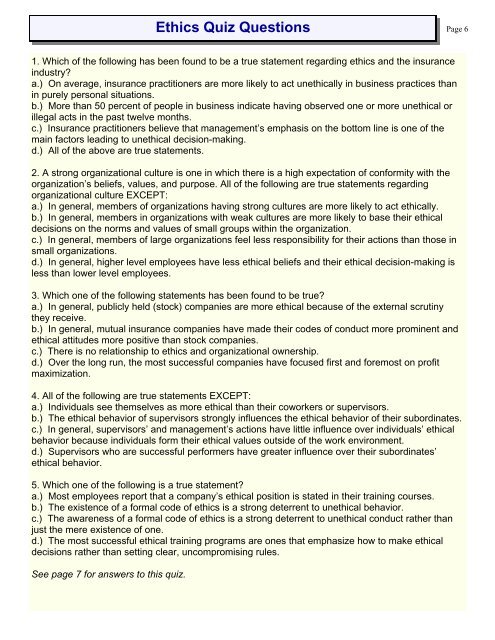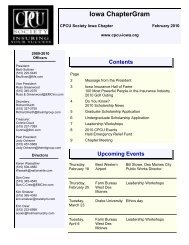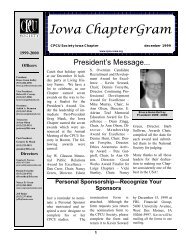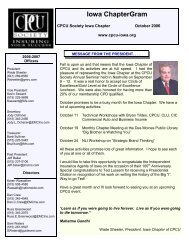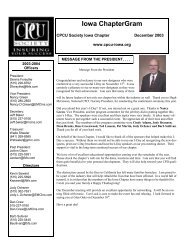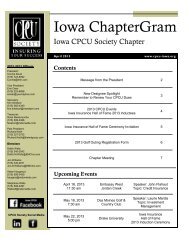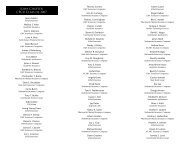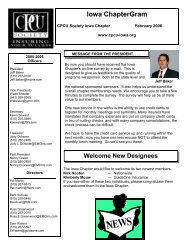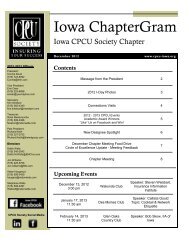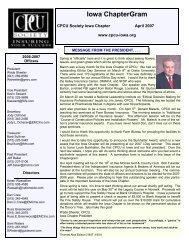Yes - CPCU Iowa Chapter
Yes - CPCU Iowa Chapter
Yes - CPCU Iowa Chapter
Create successful ePaper yourself
Turn your PDF publications into a flip-book with our unique Google optimized e-Paper software.
Ethics Quiz Questions<br />
1. Which of the following has been found to be a true statement regarding ethics and the insurance<br />
industry?<br />
a.) On average, insurance practitioners are more likely to act unethically in business practices than<br />
in purely personal situations.<br />
b.) More than 50 percent of people in business indicate having observed one or more unethical or<br />
illegal acts in the past twelve months.<br />
c.) Insurance practitioners believe that management’s emphasis on the bottom line is one of the<br />
main factors leading to unethical decision-making.<br />
d.) All of the above are true statements.<br />
2. A strong organizational culture is one in which there is a high expectation of conformity with the<br />
organization’s beliefs, values, and purpose. All of the following are true statements regarding<br />
organizational culture EXCEPT:<br />
a.) In general, members of organizations having strong cultures are more likely to act ethically.<br />
b.) In general, members in organizations with weak cultures are more likely to base their ethical<br />
decisions on the norms and values of small groups within the organization.<br />
c.) In general, members of large organizations feel less responsibility for their actions than those in<br />
small organizations.<br />
d.) In general, higher level employees have less ethical beliefs and their ethical decision-making is<br />
less than lower level employees.<br />
3. Which one of the following statements has been found to be true?<br />
a.) In general, publicly held (stock) companies are more ethical because of the external scrutiny<br />
they receive.<br />
b.) In general, mutual insurance companies have made their codes of conduct more prominent and<br />
ethical attitudes more positive than stock companies.<br />
c.) There is no relationship to ethics and organizational ownership.<br />
d.) Over the long run, the most successful companies have focused first and foremost on profit<br />
maximization.<br />
4. All of the following are true statements EXCEPT:<br />
a.) Individuals see themselves as more ethical than their coworkers or supervisors.<br />
b.) The ethical behavior of supervisors strongly influences the ethical behavior of their subordinates.<br />
c.) In general, supervisors’ and management’s actions have little influence over individuals’ ethical<br />
behavior because individuals form their ethical values outside of the work environment.<br />
d.) Supervisors who are successful performers have greater influence over their subordinates’<br />
ethical behavior.<br />
5. Which one of the following is a true statement?<br />
a.) Most employees report that a company’s ethical position is stated in their training courses.<br />
b.) The existence of a formal code of ethics is a strong deterrent to unethical behavior.<br />
c.) The awareness of a formal code of ethics is a strong deterrent to unethical conduct rather than<br />
just the mere existence of one.<br />
d.) The most successful ethical training programs are ones that emphasize how to make ethical<br />
decisions rather than setting clear, uncompromising rules.<br />
See page 7 for answers to this quiz.<br />
Page 6


